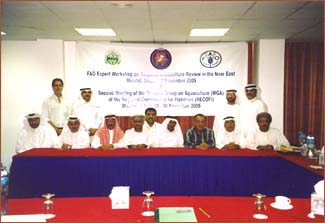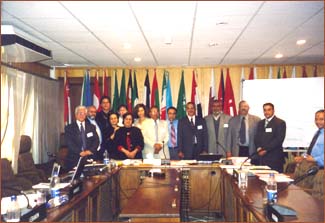Cairo, Egypt, 24–25 November 2005
Muscat, Oman, 28 November 2005
Alessandro Lovatelli1 and Sarah Poynton2
Aquaculture specialists from 16 countries in North Africa and the Near East recently had the opportunity to meet together in two expert workshops, to critique the first draft of their Regional Review, and articulate priority issues for safeguarding a sustainable future for aquaculture in the region. The stimulating and successful workshops were held in Cairo, Egypt on 24 and 25 November, 2005, attended by Algeria, Egypt, Lebanon, Libyan Arab Jamahiriya, Morocco, Syrian Arab Republic, and Tunisia; and on 28 November 2005 in Muscat, Oman, and participated by Bahrain, Iran (Islamic Rep. of), Iraq, Kuwait, Oman, Qatar, Saudi Arabia, United Arab Emirates, and Yemen, respectively. The local hosts were FAO Regional Office for the Near East in Cairo, and the Ministry of Agriculture and Fisheries in Oman. The workshops were each co-chaired by Mr Alessandro Lovatelli, FAO Responsible Lead Officer (Rome), and Mrs Sarah Poynton, Regional Reviewer (FAO Consultant).
The workshops followed an intense interactive format, opening with brief introductions, and identification of the positive and negative forces impacting aquaculture in each country. Then followed discussion and critique of the draft regional review (the 50 page document had been circulated to the expert participants some 10 days in advance of the workshops). Subsequently, structured debate of priority issues facing the aquaculture sector took place, with the experts identifying four issues: farming systems, technologies and species; health and diseases; policies, legal frameworks and institutions; and marketing and processing. For each issue, we discussed and documented justification of the issue as a priority, recognition of the four top problems, and specific needs and solutions.

Participants provided abundant and constructive input, to ensure that the regional review will reflect not only the current status of aquaculture across North Africa and the Near East, but -more importantly -the challenges being faced and solutions to be employed. An additional benefit fostered by the collegial atmosphere was the identification of new linkages between countries to support each others needs, particularly regarding expertise.
The FAO Lead Officer and the Regional Reviewer would like to take this opportunity to warmly thank all of the participants, and the local hosts, for their contributions to the enjoyable and rewarding workshops, and to wish all participants and their colleagues well for the fostering of new cooperations.
